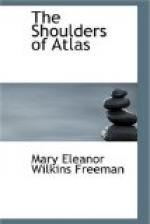At all events, the evidence against Lucinda and Hannah, when sifted, was so exceedingly flimsy, and the lack of motive grew so evident, that there was no further question of bringing them to trial. Still the suspicion, once raised, grew like a weed, as suspicion does grow in the ready soil of the human heart. For a month after the tragedy it seemed as if Sylvia Whitman’s prophecy concerning the falling off of the hotel guests was destined to fail. The old hostelry was crowded. Newspaper men and women from all parts of the country flocked there, and also many not connected with the press, who were morbidly curious and revelled in the sickly excitement of thinking they might be living in the house of a poisoner. Lucinda Hart sent in her resignation from the church choir. Her experience, the first time she had sung after Eliza Farrel’s death, did not exactly daunt her; she was not easily daunted. But she had raised her husky contralto, and lifted her elderly head in its flowered bonnet before that watchful audience of old friends and neighbors, and had gone home and written her stiffly worded note of resignation.
She attended church the following Sunday. She said to herself that her absence might lead people to think there was some ground for the awful charge which had been brought against her. She bought a smart new bonnet and sat among the audience, and heard Lucy Ayres, who had a beautiful contralto, sing in her place. Lucy sang well, and looked very pretty in her lace blouse and white hat, but she was so pale that people commented on it. Sylvia, who showed a fairly antagonistic partisanship for Lucinda, spoke to her as she came out of church, and walked with her until their roads divided. Sylvia left Henry to follow with Rose Fletcher, who was still staying in East Westland, and pressed close to Lucinda.
“How are you?” she said.
“Well enough; why shouldn’t I be?” retorted Lucinda.
It was impossible to tell from her manner whether she was grateful for, or resented, friendly advances. She held her head very high. There was a stiff, jetted ornament on her new bonnet, and it stood up like a crest. She shot a suspicious glance at Sylvia. Lucinda in those days entertained that suspicion of suspicion which poisons the very soul.
“I don’t know why you shouldn’t be,” replied Sylvia. She herself cast an angry glance at the people around them, and that angry glance was like honey to Lucinda. “You were a fool to give up your place in the choir,” said Sylvia, still with that angry, wandering gaze. “I’d sung. I’d shown ’em; and I’d sung out of tune if I’d wanted to.”
“You don’t know what it was like last Sunday,” said Lucinda then. She did not speak complainingly or piteously. There was proud strength in her voice, but it was emphatic.
“I guess I do know,” said Sylvia. “I saw everybody craning their necks, and all them strangers. You’ve got a lot of strangers at the hotel, haven’t you, Lucinda?”




